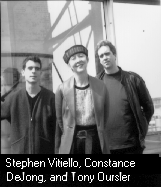Fantastic Prayers Introduction

Fantastic Prayers, Dia's first artists' project for the Web, is something of a story that plays out as a multimedia performance. The artists--writer/performer Constance DeJong, artist Tony Oursler, and musician/composer Stephen Vitiello --conceived the project independently of the Web. The work, in fact, began as plans for a performance for the rooftop of Dia's West Chelsea exhibition galleries.
The work is conceived in fragments of text, sound, and images. It describes a place called Arcadia and its young residents living in a kind of idyllic Arcadian suspension that only becomes interrupted by the intrusion of another figure, another voice, that represents something of what is outside Arcadia--that is, time, memory, and death. This fantastical encounter is filled with playful exchanges and discoveries.
While the performance was designed specifically for Dia's rooftop, around a glass and steel sculptural pavilion by Dan Graham, the artists reconfigured the piece to inhabit the electronic space of the Web. Similarly it will be adapted for other spaces--real and digital.
Fantastic Prayers slid perfectly onto the electronic field of the Web because, perhaps like the amorphous body of fragments on the Web, the piece itself is conceived as fragments rather than a whole. And, although structured as a narrative, it has little of a beginning, middle, or end--like the experience of the Web. Instead, it moves around ideas and encounters, suggesting not only the content of the artists' intentions, but also an extraordinary approach to making an artwork that sheds the boundaries of time and space, exists in real and digital environments, and shifts with every new circumstance.
Michael Govan
Director
March 31, 1995
Acknowledgements
Dia's Web site and Fantastic Prayers are the result of the tremendous enthusiasm and dedication not only of the artists previously mentioned, but also many individuals in and outside Dia that made this project possible. Dia's entire small staff has participated in some way in our digital initiative, but Sara Schnittjer Tucker, Information Systems, and Karen Kelly, Director of Publications, led the production of the project with their technical and administrative expertise.Others outside Dia--Bryan Taylor, John Kelly, Dexter Taylor, Jonathan Steuer, Peter Kirwan and Media Access Systems, Interport Communications Inc., Bruce Marchfelder and SoHo New Media--provided essential technical assistance. Alyce Dissette of 501C3, Inc., a nonprofit foundation devoted to digital media, provided assistance and inspiration and will join Dia in projects yet to be announced.
In addition to the artists, essential performers in the Fantastic Prayers project include Tracy Leipold, Kim Gordon and Sonic Youth, Julia Scher, Jim Shaw, and Seni Felic. We would also like to give special thanks to Bryan Taylor, Goran Tomcic, Dan Graham, Bob Bielecki, and Brenda Hutchinson.
The Heathcote Art Foundation assisted with grants for the artists' work on Fantastic Prayers. The sound for this project was produced, in part, at Harvestworks Inc./Studio PASS through the Artist-In-Residence Program. Additional support for audio production was received through the Electronic Arts Grants Program of the Experimental Television Center.
Finally, The Bohen Foundation provided a major and timely grant to launch Dia's Web site for all of our benefit.